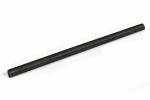ASTM FAQs
Large A193B8 Bolts
Are bolts ordered under the ASTM A193 Grade B8/B8M Class 2 specification available above 1-1/2” in diameter?The short answer is no. The A193 specification does not cover bolts larger than 1-1/2” in diameter for Class 2 materials. However, the reasoning behind this answer requires further explanation. Class 2 materials get their strength through the process of strain hardening (also known as work hardening or cold working). This process causes the grain structure... Read more

Special A325 Bolts
Why are the heads of my A325 bolts marked with the letter “S”?Under the new F3125 specification, which now governs A325 structural bolts, there is a supplementary requirement that allows A325 bolts to differ in head geometry and thread length (excluding fully threaded A325s) as required by the customer. When these alternate dimensions are required, the bolts shall be stamped “A325S”, with the “S” indicating special. Under the... Read more
Grade 7 vs Grade 7L
What is the difference between A194 grade 7 and grade 7L nuts?A194 grade 7 nuts are commonly used nuts for both high temperature and low temperature applications, and is commonly paired with bolts made to either A193 or A320. When used in conjunction with A320 bolts in a low temperature application, or if specially requested, they are charpy tested to assure they will perform well in... Read more
A320 L7 vs A320 L43
What is the difference between ASTM A320 L7 and ASTM A320 L43?As far as the mechanical and chemical makeup of both A320 Grades L7 and L43, there isn’t much of a difference at all. The main difference is that the raw material used to make A320 L7 fasteners is typically 4140, whereas the raw material used to make A320 L43 is 4340. Below is information found... Read more
B7 Length Tolerance
What is the length tolerance on ASTM A193 Grade B7 bolts?The tolerances for A193-B7 are governed by section 4 of the specification, which states, “Material and fasteners supplied to this specification shall conform to the requirements of Specification A 962/A 962M. These requirements include test methods, finish, thread dimensions, marking, certification, optional supplementary requirements, and others.” Studs (also known as All Thread Rods) would be... Read more
Substituting F1554 Grade 55 for Grade 36
My bolt supplier said they can substitute ASTM F1554 Grade 55 anchor bolts for the F1554 Grade 36 anchor bolts that are specified on my project. Is this correct?ASTM F1554 does specifically state in Section 6.4 that the manufacturing company can substitute weldable F1554 Grade 55 material in place of F1554 Grade 36 material at the option of the manufacturing company. So technically your supplier is correct that they can substitute F1554 Grade 55 for F1554 Grade 36 at any time, as long... Read more
Grade 36 Weldability
Are F1554 grade 36 bolts always weldable?F1554 Grade 36 bolts are considered weldable, and the current version of the specification specifically states this. Section 6.4 of the ASTM 1554-15 specification reads as follows: 6.4 Weldability — Grade 36 anchor bolts are considered weldable F1554 also allows for weldable Grade 55 to be substituted at the manufacturer’s discretion. The specification also notes... Read more
A36 Weldability
Is ASTM A36 steel round bar always weldable?The ASTM A36 specification reads as follows: When the steel is to be welded, a welding procedure suitable for the grade of steel and intended use or service is to be utilized. See Appendix X3 of Specification A6/A6M for information on weldability. Appendix X3 of ASTM A6/6M states: Weldability is a term that usually refers... Read more
A307 Weldability
Are ASTM A307 bolts and rods always weldable?A307 bolts, rods, and studs are not always weldable. For this grade to be weldable it must meet the supplementary requirement S1 of the ASTM A307 specification. This supplement provides assurances of weldability by additional chemical composition restrictions and by a carbon equivalent formula. In addition, “Because of the embrittling effects of welding temperatures on... Read more

A325/A490 All-Thread
What is the all thread rod equivalent for A325 and A490?In 2015, ASTM created a new, all-inclusive specification F3125 to cover A325 and A490 bolts under the same specification. There were many changes made to the specification, but it is still not acceptable to manufacture fully threaded rods in the A325 or A490 specifications. The new F3125 specification states in section 4.1.3: Bolts with thread... Read more
